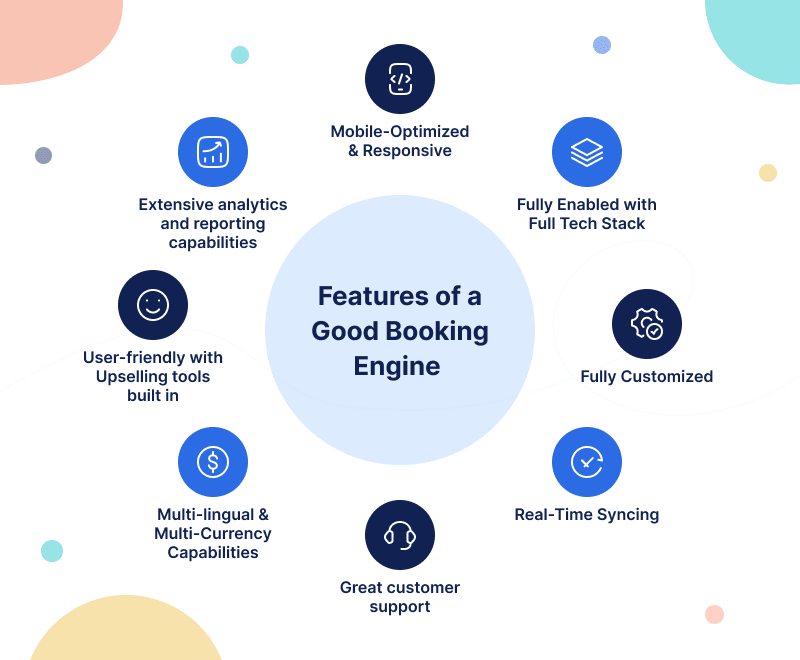Selecting an appropriate Booking Engine assists hotels in optimizing direct bookings. However, most hotels continue making critical errors that rob them of revenue, productivity, and guest satisfaction.
In this blog, we’ll explore the top 10 mistakes hotels make when choosing a booking engine and how to avoid them:
1. Selecting a Booking Engine Not Mobile Friendly
Over 50% of guests reserve on mobile, but numerous engines are not responsive.If your Booking Engine is not mobile-friendly, you’ll be losing conversions fast.
2. Choosing Booking Engine That Does Not Interoperate with Systems
Your Booking Engine should be linked with PMS, CRM, and channel manager.
Without smooth integration, manual labor and booking errors increase.
3. Disregarding Brand Customization and Design
A generic booking page disconnects from your hotel’s brand.
Guests can distrust the site if the Booking Engine is not aligned with your brand.
4. Focusing Exclusively on Low Price, Not Overall Value
Low-cost booking Engines do not usually possess basic functionality and flexibility.
Picking solely on cost can have hidden long-term expenses.
5. Neglecting the Visitor Experience
A lengthy or ambiguous process causes bookings to be cancelled by customers.
Your Booking Engine must have a clean, simple, and quick UX.
6. No Real-Time Rate and Room Sync
Deferred-update engines lead to overbookings and customer issues.
Real-time synchronizing makes your rates and rooms up to date.
7. Lack of Inspection of Data and Analytics Tools
Booking Engines without analytics make you speculate on performance.
You require source, conversion, and booking behavior insights.
8. Omitting Customer Support Quality Research
Technical problems do occur, and inadequate support prolongs recovery.
Good Booking Engines provide instant, dependable assistance when necessary.
9. Failure to Consider Multilingual Booking Options
Most engines do not have international travelers’ language support.
People are more likely to book if they view content in their native language.
10. My Failure to Test the Booking Engine with Live Users
Hotels prefer to release engines with no real guest testing or feedback.
Skipping tests leads to missed bugs and lower booking success.
Note: Ignoring Upsell and Cross-Sell Tools
Many hotels often miss out on generating additional revenue simply by failing to upsell during the booking process!
A smart Engine generally provides you the opportunity to add all kinds of add-ons during the booking process, such as breakfast, tours, or late checkout.
How These Mistakes Affect Your Hotel
Each one of these mistakes hinders the hotel’s ability to sell rooms.
If an online user experience is poor or if a hotel is using outdated or poor booking tools, it simply drives guests back to online travel agencies, or worse yet, competitors.
When a guest comes across a complicated reservation form or an unknown language, they leave.
When a staff member has a slow support team, poor tools, and a lack of integrations, both they and the customer become frustrated.

What a Good Booking Engine Should Offer
To ensure you can make an informed decision, your Booking Engine should have the following features:
- Mobile-Optimized & Responsive
- Fully Enabled with Full Tech Stack
- The Ability to be Fully Customized.
- Real-Time Syncing.
- Great customer support.
- Multi-lingual & Multi-Currency Capabilities.
- User-friendly with Upselling tools built in.
- Extensive analytics and reporting capabilities.
Conclusion:
Avoiding these traps will make your Booking Engine an asset, not a liability. It ought to generate direct bookings, reduce dependency on OTAs, and enhance the guest experience.
The proper Booking Engine yields high ROI, enhanced operations, and enhanced guest satisfaction. Streamline, integrate, and focus on features according to your hotel objectives.
If you are choosing a new Engine, slow down, compare, and test extensively before going live. Don’t let a small error slow your hotel down.
Get started with QloApps today and take your hotel to the next level!
Please share your views in the comment box.
If you want to learn about the functionality of QloApps, then you can visit this link: QLO Reservation System – Free Open-Source Hotel Booking & Reservation System.
Be the first to comment.